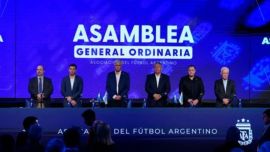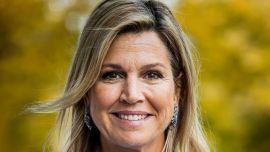Alberto Fernández was once known for the relatively low profile he kept during his years of active political life. But that all changed when Cristina Fernández de Kirchner threw her support behind him and announced she’d be running – but alongside him, for vice-president – in a bid to return to the Casa Rosada.
The 60-year-old lawyer – who once served as Cabinet chief to the former president – will today become Argentina's eighth elected president since the end of the brutal 1976-1983 military dictatorship. Fernández obtained 48 percent of the votes in October’s race, a somewhat surprising result for a candidate who had only run in one popular vote previously — the 2000 elections for the Buenos Aires City legislature.
Ironically, perhaps Fernández’s stand-out political performance was when he resigned as Fernández de Kirchner’s cabinet chief — a role he had also held during her late husband Néstor Kirchner's administration — during the simultaneous 2008 battles with Argentina's powerful agricultural industry and the nation's media outlets.
For some academics, this episode indicates the incoming leader's independence, especially for those who believe he might become a puppet of his vice-president.
“Fernández stopped Cristina Fernández de Kirchner in 2008 and he renounced her. She couldn’t control him then, and she’ll be even less able to do so now,” says analyst Raúl Aragón.
Mauricio Macri’s supporters, and in fact his campaign itself, struck another chord, warning often of the influence the iconic Kirchnerite leader would have should the Frente de Todos ticket assume office.
“If Fernández wins, Cristina wins, and she will govern. She’s the one with the power, there’s no doubt,” said Miguel Ángel Pichetto, who ran as Macri’s vice-president this year.
Those around him say that Fernández will continue to listen to – and ask – for the opinion of his vice-president.
“The Frente de Todos coalition exists because Cristina had enormous generosity, it would be thankless not to say that,” Fernández said. “I think she knows better than anybody what Argentina lacks and realised that to achieve change, she needed to take a step to the side.”
'Liberal, progressive, Peronist'
Supporters of Fernández, such as national deputy for Buenos Aires City Daniel Filmus, describe Argentina's next leader as someone with whom you can have “converse about many things,” even among “diverse actors.”
His critics, however, consider him too much of a chameleon, garnering support from neo-liberal sectors and populist governors. “I am inaugurating a strain of liberal, progressive peronism,” Fernández has said.
“Fernández is a moderate leader who was highlighted throughout history as a successful operator,” said Mariano Fraschini, a political scientist and professor at the University of Buenos Aires (UBA). “His centrist politics are characterised by the search for consensus and the growth of his support base.”
According to analyst Enrique Zuleta, Fernández’s biggest challenge will be taking the reigns of a diverse Peronist government, which he described as a “heterogeneous coalition.”
Privacy and personal life
Fernández was born in Buenos Aires, making him the first porteno to be elected to the presidency since Roberto M. Ortiz in 1938.
He attended three different elementary schools in the capital, followed by high school (secondary school) at Colegio Mariano Moreno. There, he made his first contact with the Peronist movement. He then went on to study law at UBA, where he has remained, teaching as a professor for 30 years.
The president-elect’s other interests include playing the guitar, especially romantic songs and Argentine rock nacional, and Boca Juniors.
His long-term partner – and soon-to-be first lady – is Fabiola Yanez, a journalist and actress. His 24-year-old son Estanislao, born during a previous relationship, has drawn plenty of attention as a drag queen and “cosplayer.”
“He keeps a very low profile and is very involved in the movements against sexual discrimination,” Fernández said of his son.
From Cabinet chief to critic
Fernández's most famous moment, in terms of mainstream politics and his running-mate – came in 2008, when he resigned as Cabinet chief after serving under both the Kirchners.
On July 23 that year, he resigned his post, largely due to disagreements over the then-president Fernández de Kirchner's decision to raise export duties on farmers, which prompted fierce protests from the agricultural sector.
“I found it very hard to find a valuable element of the second term of Cristina Fernández de Kirchner,” Fernández said at the time. He was a fierce critic of her governance after his departure.
In 2011, he maintained his opposition, publishing an open later in La Nación calling Fernández de Kirchner a “liar” and condemning her “necessity to construct an alternate reality in which she lives.”
The next year, he added that “the president must know that I won’t be quiet,” even going so far to accuse her of “erasing everything that Néstor did.”
“Peronism was liberal with Menem, conservative with Duhalde, progressive with Kirchner and pathetic with Cristina,” he said at the end of 2015.
This made his return to the fold in 2018 all the more confusing for many. On February 7, Fernández revealed that the two had met to discuss the deep divisions within Peronism and Kirchnerism head of the general elections and the danger that posed to their ability to defeat Macri at the ballot box.
“We have many visions in common, fundamentally the critique of the present administration,: Fernández said at the time.
“All the Peronists have to understand that with Cristina they can’t advance but without her it can’t be.”
– TIMES/PERFIL



















Comments